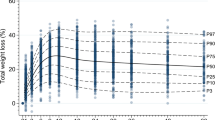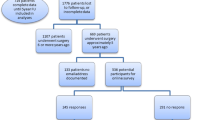Abstract
Background
When assessing and reporting the performance of bariatric procedures, longitudinal total weight loss % (TWL%) is the preferred method of choice. This averages out significant individual weight regains. Due to no assessment of individual weight trajectories, numerous patients with weight recidivism are missed in the overall assessment of the applied procedures.
Materials and Methods
The SIMPLE acronym (Survival analysis of Interpolated weight trajectories in a Markov chain, assessing Predictors, Longitudinal TWL% and individual procedure success and relapse Events) provides a framework to assess the performance of bariatric procedures in everyday practice, identifying a procedures’ overall performance both in terms of longitudinal total weight loss % and individual events of weight regain. The SIMPLE approach is demonstrated on a cohort of 907 bariatric patients collected over 7 years. Six hundred eighteen patients received a primary RYGB, 81 a primary SG, while 208 were conversions to either a RYGB (n = 198) or SG (n = 10). Successful surgery was defined as 20% TWL; a weight regain as a 15% increase from the lowest individually attained weight post-surgery.
Results
The longitudinal TWL% performance at 5 years was 34.5%, 21.3%, and 22.9% for the primary RYGB, primary sleeve gastrectomy, and conversion operation, respectively. However, nearly 20% of the conversion operations never reached success, while 33.5% registered a relapse event within 5 years.
Conclusion
The combined approach of the SIMPLE assessment clearly showed that a non-trivial amount of individuals did not achieve success or regained significant weight after surgery. This indicates that a combined approach to reporting bariatric performance is preferred.




Similar content being viewed by others
References
1.Grover BT, Morell MC, Kothari SN, Borgert AJ, Kallies KJ, Baker MT. Defining Weight Loss After Bariatric Surgery: a Call for Standardization. Obesity Surgery. 2019;29(11):3493-9.
Reinhold RB. Critical analysis of long term weight loss following gastric bypass. Surg Gynecol Obstet. 1982 Sep.
3.Corcelles R, Boules M, Froylich D, Hag A, Daigle CR, Aminian A, et al. Total Weight Loss as the Outcome Measure of Choice After Roux-en-Y Gastric Bypass. Obesity Surgery. 2016;26(8):1794-8.
4.Odom J, Zalesin KC, Washington TL, Miller WW, Hakmeh B, Zaremba DL, et al. Behavioral Predictors of Weight Regain after Bariatric Surgery. Obesity Surgery. 2010;20(3):349-56.
5.Peterli R, Wölnerhanssen BK, Peters T, Vetter D, Kröll D, Borbély Y, et al. Effect of Laparoscopic Sleeve Gastrectomy vs Laparoscopic Roux-en-Y Gastric Bypass on Weight Loss in Patients With Morbid Obesity. JAMA. 2018;319(3):255.
6.Hatoum IJ, Kaplan LM. Advantages of percent weight loss as a method of reporting weight loss after Roux-en-Y gastric bypass. Obesity. 2013;21(8):1519-25.
7.Arterburn D, Gupta A. Comparing the Outcomes of Sleeve Gastrectomy and Roux-en-Y Gastric Bypass for Severe Obesity. JAMA. 2018;319(3):235.
Jenny H. Kang QAL. Effectiveness of bariatric surgical procedures: A systematic review and network meta-analysis of randomized controlled trials. 2017 Nov 17.
9.Shimbo D. Dietary and lifestyle factors in hypertension. Journal of Human Hypertension. 2016;30(10):571-2.
10.Zuraikat FM, Thomas E, Roeshot D, Gallagher D, St‐Onge MP. Can Healthy Sleep Improve Long‐Term Bariatric Surgery Outcomes? Results of a Pilot Study and Call for Further Research. Obesity. 2019;27(11):1769-71.
11.Anderson C, Platten CR. Sleep deprivation lowers inhibition and enhances impulsivity to negative stimuli. Behavioural Brain Research. 2011;217(2):463-6.
12.Barber LK, Munz DC. Consistent-sufficient sleep predicts improvements in self-regulatory performance and psychological strain. Stress and Health. 2011;27(4):314-24.
Author information
Authors and Affiliations
Corresponding author
Ethics declarations
Ethics Approval
The study received approval from the Healthcare Ethics Committee on the 26th of January 2018, project numbers 2017/1625 and 2017/1626.
Informed Consent
Informed consent was obtained from all individual participants included in the study.
Conflict of Interest
The authors declare no competing interests.
Additional information
Publisher’s Note
Springer Nature remains neutral with regard to jurisdictional claims in published maps and institutional affiliations.
Rights and permissions
About this article
Cite this article
de Vries, L., Van den Broecke, C., Decruyeneare, A. et al. A SIMPLE Performance Assessment of Bariatric Procedures and Post-operative Weight Regain. J Gastrointest Surg 26, 542–549 (2022). https://doi.org/10.1007/s11605-021-05172-1
Received:
Accepted:
Published:
Issue Date:
DOI: https://doi.org/10.1007/s11605-021-05172-1




